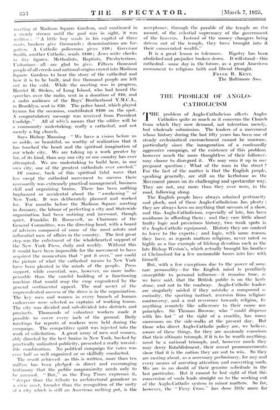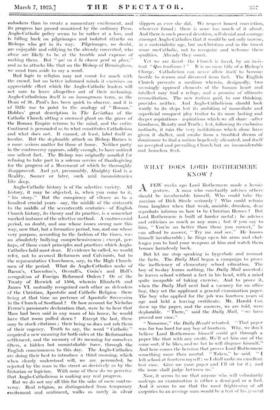T HE problem of Anglo-Catholicism affects Anglo- Catholics quite as much
as it concerns the Church from which they now demand, not toleration merely, but wholesale submission. The leaders of a movement whose history during the last fifty years has been one of steady ecclesiastical encroachment cannot be unaware, particularly since • the inauguration of a confessedly aggressive campaign, of the existence of this problem, however much the more thoughtless of their follower; may choose. to disregard it. We may sum it up in on pregnant question : What of the man in the street ? For the fact of the matter is that the English people, speaking generally, are still on the kerbstone as the Movement passes on its challenging and spectacular way. They are not, any more than they ever were, in the road, following along.
The English people have always admired pertinacity and pluck, and of these Anglo-Catholicism has plenty ; they are always keen on anything that savours of a show, and this Anglo-Catholicism, especially of late, has been assiduous in affording them ; and they care little about faulty logic and precarious history, two weak spots in tie Anglo-Catholic equipment. History they are content to leave to the experts ; and logic, with some reason, they have, as regards matters religious, never rated so highly as a fine example of lifelong devotion such as the late Bishop Weston's, which actually brought his brother of Chelmsford for a few memorable hours into line with himself.
But, with a few exceptions due to the power of some rare personality—for the English mind is peculiarly susceptible to personal influence—it remains true, as we have said, that the British public is on the kerb- stone, and not in the roadway. Anglo-Catholic leader' arc singularly misled if they mistake a compound o! curiosity, the sporting instinct, aversion from religious controversy, and a real reverence towards religion, fot anything remotely like adherence to their cause and principles. Sir Thomas Browne, who " could dispense with his hat " at the sight of a crucifix, has many, successors on the side-walks at the present day. But those who direct Anglo-Catholic policy are, we believe, aware of these things, for they are anxiously conscious that their ultimate triumph, if it is to be worth anything, must be a national triumph, and, however much they may decry Establishment, their recent pronouncements show that it is the nation they are out to win. So they arc casting about, as a necessary preliminary, for any and every means of arresting attention and converting souls. We are in no doubt of their genuine solicitude in the last particular. But it cannot be lost sight of that this conversion of souls leads straight on to the working out of the Anglo-Catholic system in minor matters. So far, -however, the " Fiery Crass 7' has done little more for onlookers than to create a momentary excitement, and its progress has passed unnoticed by the ordinary Press. Anglo-Catholic policy seems to be rather at a loss, and is falling back on pilgrimages and isolated attacks on Bishops who get in its way. Pilgrimages; no doubt, arc enjoyable and edifying to the already converted, who alone are likely to be at the trouble and expense of making them. But " qui va a la chase perd sa place," and as to attacks like that on the Bishop of Birmingham, we must turn aside to say a word.
Bad logic in religion may not count for much with the crowd, but on better informed minds it exercises an appreciable effect which the Anglo-Catholic leaders will not care to leave altogether out of their reckoning. Anglo-Catholicism itself is an incongruous term, as the Dean of St. Paul's has been quick to observe, and it is of little use to point to the analogy of " Roman." Hobbes' great description in The Leviathan of the Catholic Church sitting a crowned ghost on the grave of the Roman Empire returns to the mind, and the entire Continent is persuaded as to what constitutes Catholicism and what does not. It cannot, at least, label itself as insular. But the deplorable attack on Bishop Barnes is a more serious matter for those at home. Neither party in the controversy appears, oddly enough, to have noticed one salient fact. The Bishop was originally assailed for refusing to take part in a solemn service of thanksgiving for the progress of a Movement of which he thoroughly disapproved. And yet, presumably, Almighty God is a Reality. Sooner or later, such acid inconsistencies bite deep.
Anglo-Catholic history is of the selective variety. All history, it may be objected, is, when you come to it, " his story." But the conspiracy of silence as to a hundred crucial years—say, the middle of the sixteenth to the middle of the seventeenth centuries—of English Church history, its theory and its practice, is a somewhat marked instance of the selective method. A controversial period, no doubt, and one whose issues swung now this way, now that, but a formative period, too, and one whose very purpose, according to the fashion of the times, was an absolutely bullying comprehensiveness ; except, per- haps, of those exact principles and practices which Anglo- Catholics hold most dear. If evidence be called, we would refer, not to avowed Reformers and Calvinists, but to the representative Churchmen, nay, to the High Church- men of the period. What do Anglo-Catholics make of Bacon's, Clarendon's, Overall's, COsin's and Hall's recognitf on of Foreign Reformed Orders ? Or of the Treaty of Berwick of 1586, wherein Elizabeth and James VI. mutually recognized each other as defenders of the Christian, Apostolic and Catholic Religion--there being at that time no pretence of Apostolic Succession in the Church of Scotland ? Or how account for Nicholas Ferrar's passionate declaration that, were he to hear that Mass had been said in any room of his house, he would have that room pulled down ? Except the last, these may be stock citations ; their being so does not rob them of their cogency. Truth to say, the word " Catholic " acquired a new meaning for both sides at the Reformation settleinent, and the memory of its meaning for ourselves filters, a hidden but unmistakable force, through the English consciousness to this day. The Anglo-Catholics arc doing their best to introduce a third meaning, which when clearly understood will, we arc persuaded, be rejected by the man in the street as decisively as by the historian or logician. With none of these do we perceive that Anglo-Catholicism is making any real progress.
But we do not say all this for the sake of mere contro- versy: Real religion, as distinguished from temporary excitement and -sentiment, Walks as rarely in silver slippers as ever she did. 1Ve respect honest conviction, wherever found ; there is none too much of it about. And there is such proved devotion, self-denial and courage amongst Anglo-Catholics that it would be not only unwise, in a materialistic age, but 1111-Christian and in the truest sense un-Catholic, not to recognize and welcome these qualities. Already they count.
Yet we are faced— the Church is faced, by an insis- tent " Quo tendi ? " It is no mere title of a Bishop's Charge. Catholicism can never allow itself to become hostile to reason and divorced from fact. The English Church presents a medium wherein, designedly, two seemingly opposed elements of the human heart and intellect may Lind a refuge, and a promise of ultimate reconciliation. The new tenium quid, to our thinking, provides neither. And Anglo-Catholicism should look warily to its steps lest its ambition of immediate and superficial conquest play traitor to its more lasting and deeper aspirations-- aspirations which we all share--after Goodness, Beauty and Truth ; lest, following its exclusive instincts, it ruin the very institutions which alone have given it shelter, and awake from a troubled dream of dominance to find a nation hopelessly alienated, and itself no accepted and prevailing Church but an inconsiderable and homeless Sect.



























































 Previous page
Previous page